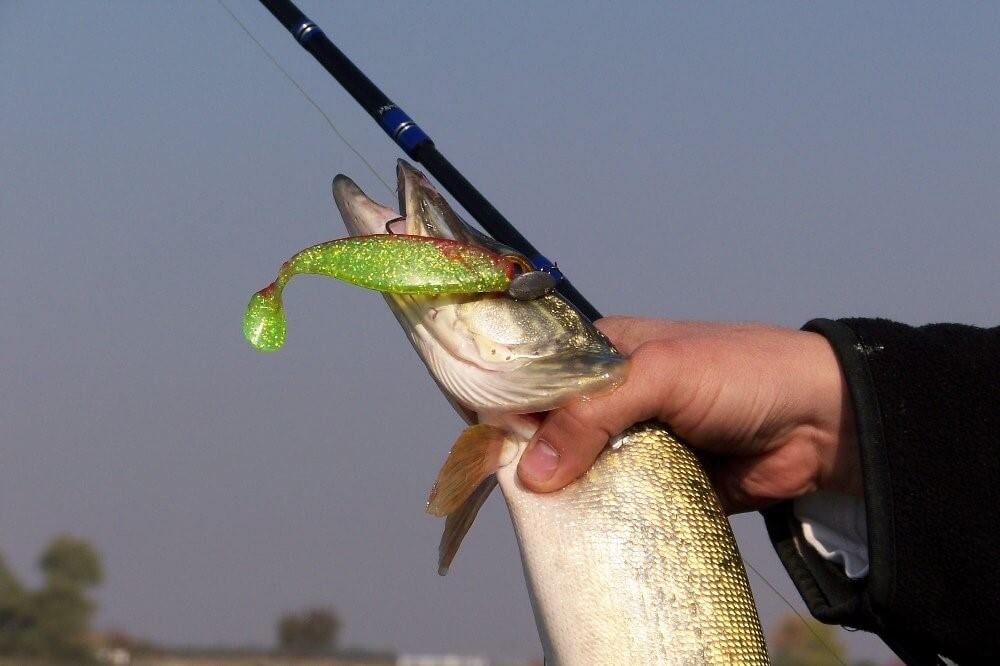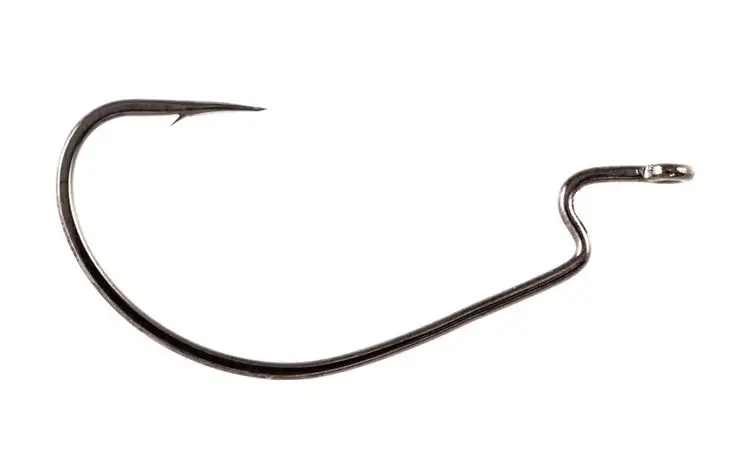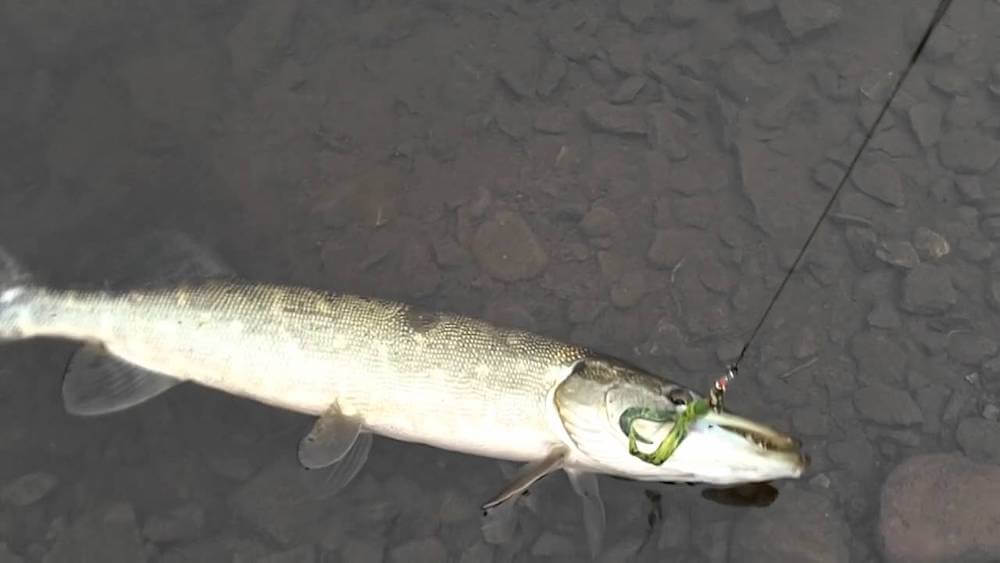An offset hook is a fishing tool with a curved or hooked end. The hook curve helps keep the bait in place, while the offset allows for more control when landing a fish.
This type of hook can be very beneficial for fishermen, as it provides an easier way to catch fish.
What Is an Offset Hook and What Does It Do?

An offset hook is a fishing hook bent at an angle, typically between 15 and 45 degrees. The offset helps the hook lodge in the fish’s mouth more securely. It also makes it more difficult for the fish to shake the hook loose.
The main advantage of using offset hooks is that they are less likely to get tangled in the weeds or other debris that can be found at the bottom of a lake or river.
They are also less likely to snag on the rocks and logs found in these same areas.
Another advantage of offset hooks is that they provide a better hooking percentage than straight-shanked hooks. This means that more fish caught with offset hooks will stay on the hook until they are reeled in.
Offset hooks can be found in various sizes and styles to suit different fishing conditions. They are most commonly used for bait fishing but can also be used for lure fishing and fly fishing.
How Can You Use an Offset Hook
An offset hook is a type of fishing hook designed to be more effective at snag-free fishing. The offset in the hook’s shank creates a “bend” in the metal, which helps the point of the hook dive to fish more easily and hold on better when they thrash about.
If you like to fish in areas with a lot of vegetation or debris, an offset hook can be a great choice. The offset helps the hook’s point penetrate through cover and catch fish more easily.
Offset hooks are one of the most versatile tools in your tackle box. Here are just a few ideas on how you can use them:
- Fishing around docks and piers: Offset hooks are great for fishing around docks and piers because they help keep your baits away from the structure, making them less likely to get snagged.
- Fishing in heavy cover: Offset hooks can also be helpful when fishing in heavy covers, such as thick weeds or brush. The offset design helps keep your bait from getting tangled in the vegetation.
- Fishing with live bait: If you’re using live bait, such as minnows or worms, an offset hook can help keep the bait on the hook longer. In addition, the offset design prevents the bait from sliding down the hook’s shank, making it less likely to be eaten by a fish.
- Fishing with artificial lures: Offset hooks can also be used with artificial lures, such as plastic worms or jigs. The offset design helps keep the lure in place and prevents it from being pulled off the hook by a fish.
What Are the Benefits of Using an Offset Hook

If you’re like most people, you probably don’t give much thought to the type of hook that you use when fishing.
However, a few different types of hooks are available, and each has its advantages and disadvantages. One type of hook that is often overlooked is the offset hook.
Offset hooks have several benefits that make them ideal for certain situations. They’re much less likely to become tangled in the weeds or other debris that often cause traditional hooks to get snagged.
They’re also significantly less likely to gut-hook a fish, which can cause serious injury or even death.
Overall, offset hooks are a great choice for anyone who wants to improve their fishing success while also reducing the risk of harming the fish they catch. So give them a try the next time you’re out on the water.
Offset hooks are great for fishing in weedy areas because they are less likely to get tangled in vegetation.
They are also less likely to gut-hook a fish, which can cause serious injury or death. If you look to improve your fishing success while also reducing the risk of harming the fish you catch, offset hooks are a great choice.
Where Can You Find an Offset Hook
An offset hook is a type of fishhook characterized by its offset point. This means that the hook’s point is not in line with the hook’s shank. Instead, it is bent to one side.
Offset hooks are designed to sit better in the mouth of a fish when they are being reeled in. This type of hook is also less likely to become caught on rocks or other objects when fishing in a river or stream.
Offset hooks can be found at most tackle shops. However, they come in various sizes, so you will need to decide what size hook you need based on the type of fish you are hoping to catch.
If you are not sure what size offset hook you need, ask a salesperson at the tackle shop for help. They will be able to give you some guidance on which size hook will work best for the type of fishing you are planning to do.
Now that you know more about offset hooks give them a try the next time you go fishing. You might be surprised at how much they can improve your success rate.
How Much Should You Spend on a Quality Offset Hook
It’s no secret that certain fishing hooks can be quite expensive. But what many anglers don’t realize is that not all hooks are created equal.
There is a big difference between a cheap hook and a quality offset hook – and it’s worth spending the extra money on the latter. Here’s why:
An offset hook is a type of fishing hook that has been designed to provide a better level of penetration. The hook’s point is offset, or bent, to the side to more easily pierce through the fish’s flesh.
This makes it much less likely for the fish to “slip off” the hook and increases the chances of a successful catch.
Offset hooks are also generally much sharper than their non-offset counterparts. They are designed to penetrate flesh more easily and require a sharper point.
On the other hand, cheap hooks are often made from lower-quality steel, which results in a duller point.
In short, offset hooks are better for serious anglers who want to increase their chances of success. They may cost a bit more, but they’re definitely worth the investment.
Examples of How to Use an Offset Hook for Different Types of Fishing

Fishing with an offset hook can be a great way to improve your success rate, especially if you’re fishing for smaller fish. Here are some examples of how you can use an offset hook when fishing for different types of fish:
- When fishing for trout, use an offset hook to help you keep the bait in place.
- When fishing for bass, use an offset hook to help you avoid snagging on vegetation.
- When fishing for crappie, use an offset hook to help you keep your bait suspended off the bottom.
- When fishing for catfish, use an offset hook to help you keep your bait on the bottom.
As you can see, there are many different ways to use an offset hook when fishing for different types of fish. So, next time you’re out on the water, give it a try and see how it can benefit you.
Conclusion
If you’re looking for a versatile and reliable hook, offset hooks are worth considering. Their unique design can be used for various fishing techniques, making them a great choice for both novice anglers and experienced fishers alike.

